
Sirlin Games is known for its series of games set in the Fantasy Strike universe, in which many colorful characters take part in a Street Fighter-esque tournament. Although the games feature the same characters, they have very different mechanics and gameplay. Yomi is a head-to-head fighting game that has a Rock-Paper-Scissors mechanic at its core (but adds a lot of variation to it). Flash Duel has you moving back and forth on a bridge, trying to get into position to land an attack. Puzzle Strike is a deck-building game inspired by the Puzzle Fighter video game, though it uses cardboard “chips” instead of cards.
What I’ve come to expect from designer David Sirlin is a game that is really well-balanced and offers deep strategic play—and a lot of replayability for those who want to take it to the next level. (Though I’ll admit that I rarely get to play any games enough times to hit that next level.) His latest game, now on Kickstarter, may seem like a bit of a departure from the others. It’s a poker-ilke gambling game: Pandante.
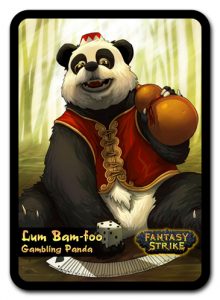 Now, it’s not totally out of the blue: one of the Fantasy Strike fighters is Lum Bam-foo, the gambling panda. In all three of the previous games, Lum has some abilities that are great for players who like to press their luck.
Now, it’s not totally out of the blue: one of the Fantasy Strike fighters is Lum Bam-foo, the gambling panda. In all three of the previous games, Lum has some abilities that are great for players who like to press their luck.
Well, now we finally get to see this game that the pandas play in Pandaland. It has elements of poker: lying is strongly encouraged, and there are some crazy abilities that come into play.
Here’s what comes with the game:
- 6 game boards
- 1 dealer button
- 6 Panda Lord cards
- 6 “!” challenge cards
- 6 rules cards
- 61 Pandante deck cards
The deck consists of 1 Joker, and then cards numbered 1 through 10 in each of 6 colors. All of the cards are oversized, with a minimalist graphic design. Depending on the level you back, you can also optionally get other things, like a set of oversized poker cards that have a similar graphic design, a set of minimalist Yomi decks, posters, and high-end ceramic poker chips. That seems to be the big push for the Kickstarter, because ceramic chips aren’t cheap. The basic game is a $35 pledge, and the versions with chips will run $250 and up.
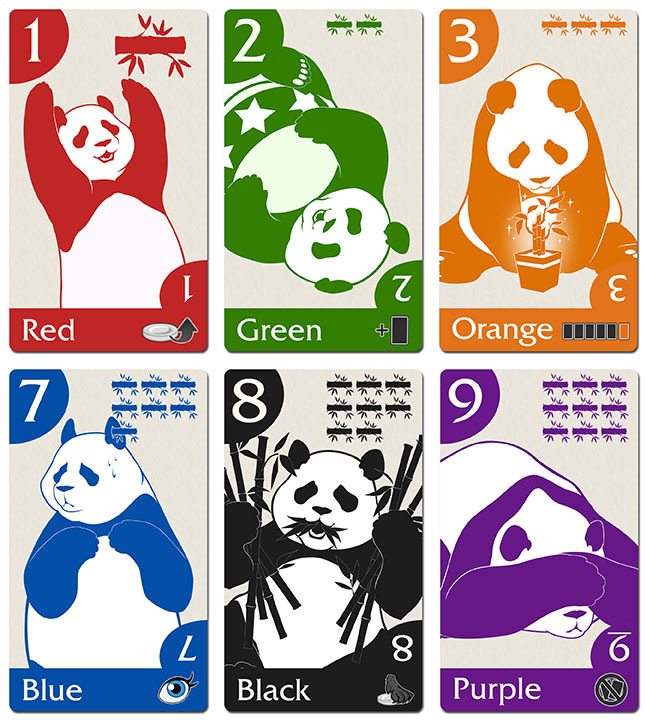
The game works for 2 to 6 players, although (like poker) I would recommend playing with at least 3. With 2 players, you’re just trading money back and forth and it seems a little less interesting to me.
Each person starts with 50 gold, and the goal is to win a certain amount of gold based on the number of players. Everyone gets a player board, a “!” challenge card, and two cards from the deck.
Each round, or gambit, has a few steps that are similar to Texas Hold ‘Em. After everyone antes 1 gold to the pot, there’s the Splash (3 community cards face up), then the Paws (1 more face up) and then the Tail (1 more face up). At each step there’s a betting phase, and there are also some opportunities to get new cards for your hand as well.
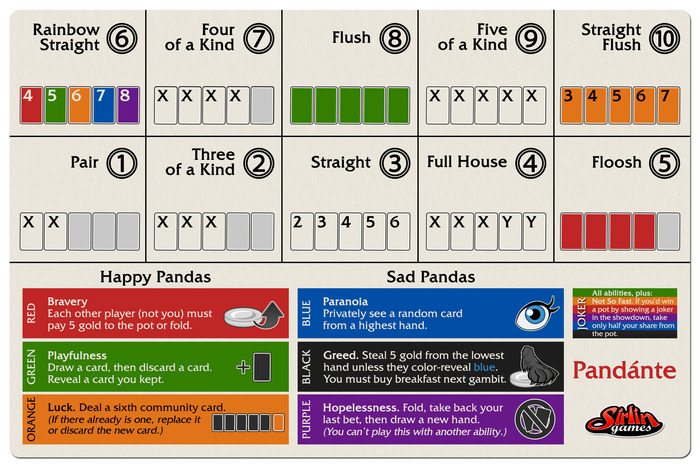
The betting is where things really differ from traditional poker. First, there are two new hands—the “Floosh,” which is a four-card flush, and the “Rainbow Straight,” which is a straight with all different colored cards. During each betting phase, you always put 2 gold on one of the hands listed on the board, or fold (though you can’t fold during the Splash). In subsequent phases, you can bet the same thing again (putting another 2 gold on the same space) or bet on a higher hand, but you can never bet on a lower hand.
In the Splash and the Paws, after the betting round there’s a “snacks” round. You may draw a card from the deck, and then discard back to two cards. If you currently have the highest claimed hand, you can have a snack for free. Otherwise, you have to pay—and the further your hand is from the highest claimed hand, the more the snack costs.
In the last phase, the Tail, there’s no snacks round. Instead, after the betting round, everyone gets a chance to use their abilities, based on the two cards in their hand. Each color gives you an ability, as shown on the board:
- Red: Everyone else has to add 5 gold to the pot or fold.
- Green: Draw a card, discard a card, then reveal one of your kept cards.
- Orange: Deal out a 6th community card. (If there’s already one, you can choose whether to replace it or discard the newly drawn card.)
- Blue: Look at a random card from the highest claimed hand.
- Black: Steal 5 gold from the lowest claimed hand.
- Purple: Fold, take back your last bet, and draw a new hand.
And this is where the challenges come in. You announce what color abilities you want to use. Then everyone else gets a chance to challenge you by throwing down their “!” cards. If you’re challenged, you have two choices: fold, don’t use any abilities at all, and pay every challenger 5 gold; or reveal that you indeed have the correct colors (just showing the color portion, not the number), and each challenger pays you 5 gold.
After everyone has used their abilities, there’s one more opportunity to bet on a higher hand. Then you check to see who has the highest claimed hand. In the case of ties, you have to reveal more information about your hand—what’s the high card, what’s the kicker, and so on, until either somebody has a higher hand or they’re completely tied.
And then everyone gets a chance to challenge the highest hand. Once again, if you are challenged, you can fold and pay your challengers 5 gold. However, if you were telling the truth and reveal your hand, not only do you win the pot, but each challenger pays you 4X gold, where X is the number of players. It makes challenging the highest hand a tough decision. If the highest hand folds, then you move the next highest, and so on, until a winner is determined, and they get to take the pot.
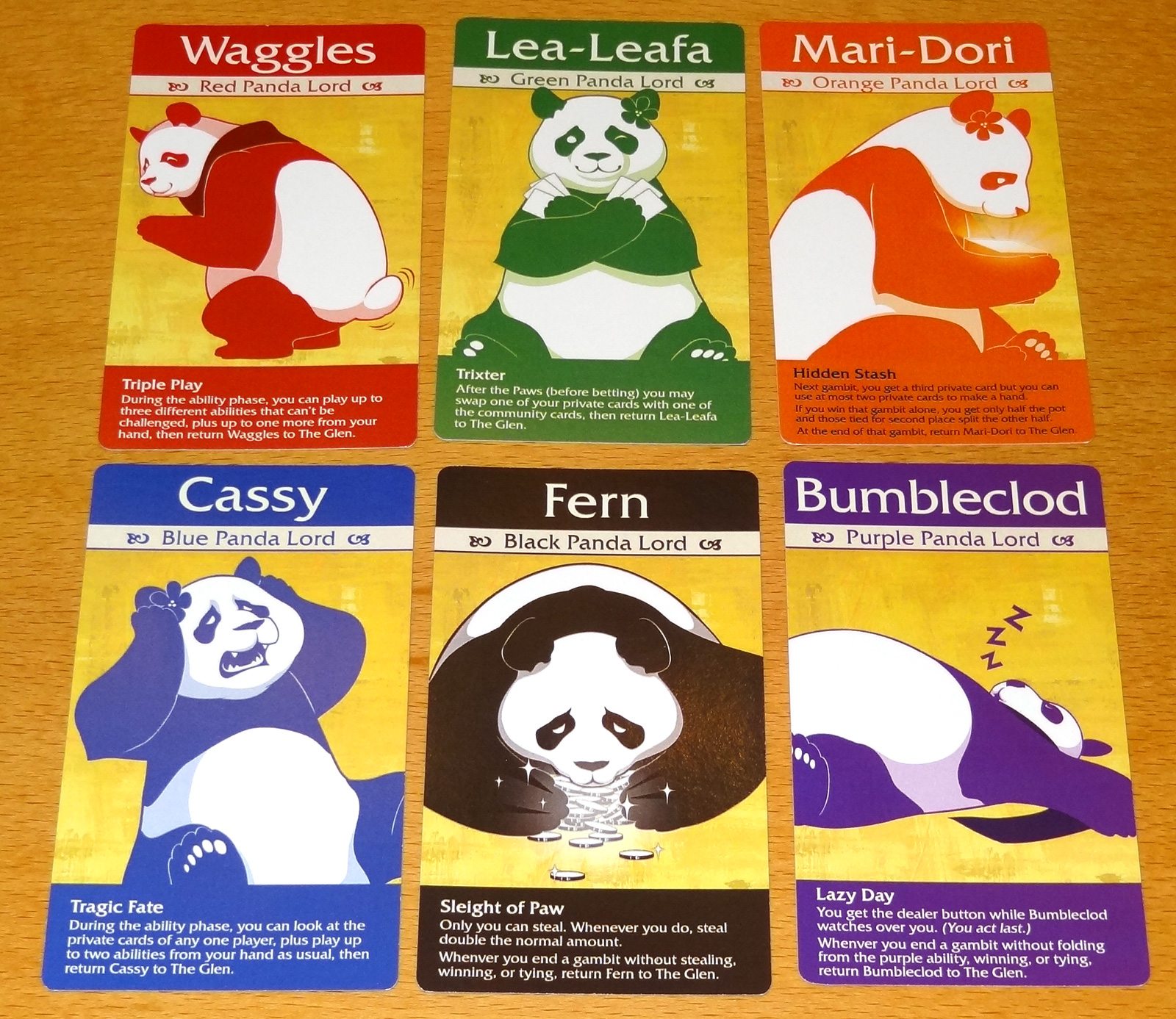
If you win the pot, and you were lying about your hand, you can then take any of the six Panda Lords (even if they currently belong to another player). The Panda Lords have particularly powerful effects, like letting you play 3 color abilities that can’t be challenged, or getting a third private card in your hand for the gambit.
Finally, one more difference from traditional poker: the winner must discard their hand and get two new cards for the next gambit. Everyone else, however, gets to choose: either keep your hand for the next gambit, or pay 2 gold to the pot for “breakfast” to get a new hand.
The game continues until one player has accumulated enough gold to win.
There’s some other stuff in there as well—for instance, the magic gold fairy who refills your gold if you go below 20, and the Joker has a few special rules that apply to it as well, but that’s the gist of it.
Verdict
I played a few rounds of Pandante with a couple different folks, just 2 and 3 player games. I do think it’s a fascinating game, but works better with at least 3. I haven’t gotten a chance to try with 4 to 6 players, but I think the interactions with more players makes the game even better.
I haven’t played a lot of poker, but it seems like one of the difficulties in adjusting between poker and Pandante is the way that you can’t back down on bets. You’re not just betting in a general sense of how good your hand is; you’re specifying which hand you have. So, for instance, if you claim to have a flush, but then manage to get a four of a kind, that does you no good at all, whereas in traditional poker that’d still be a good hand. In this case, though, if somebody calls you on a Flush then your four-of-a-kind doesn’t help a bit.
The other interesting thing about betting is that by betting higher, you can get snacks (replacement cards) for less, increasing the opportunity to get a better hand. You have to strike a balance between betting high—and being stuck with that higher claim—or paying more for the chance to get better cards.
The way that the challenges are structured adds formality to how you lie and how you call somebody on a lie. In poker, really the only thing you can do is keep betting if you think somebody’s bluffing. Here, though, there are a couple of chances to challenge them—and if you’re right, you can earn some money outside of the pot, or perhaps get a little more information about what’s in somebody’s hand.
Pandante is pretty quirky, which can be good or bad, depending on the people you’re playing with. The terminology—breakfast, snacks, splash, paws, tail—make it funnier for some people, but a few of my gamer friends got pretty fed up with it, and thought the idea of “frolicking with the magic gold fairy” was just a little too weird.
It’s also not a cheap game: $35 for a deck of cards and 6 boards seems a little steep compared to some games. I think if you liked Pandante it is a game you could play all the time, the way people get together for poker night. However, I’m not sure if hardcore poker players are the target audience or if it’s more people who like the idea of poker but never quite got into it.
And, of course, if you want the version with all the nice poker chips, then you’re looking at $250-300 for the set. From what I’ve read, that’s not an unreasonable price for a nice set of ceramic chips, but it’s not a bargain, either. Perhaps it mostly depends on whether you were in the market for a set of chips to begin with, or if you really like Pandante. For me, I’d consider the base game, but I don’t see my gaming group playing Pandante or poker enough to justify the cost of the chips.
If you want to try out Pandante before you pledge, you can get the print-and-play from Sirlin Games for $8. (The print-and-play is regular card-sized to make it easier to make, but the final game will have the big cards.)
Find out more at the Pandante Kickstarter page.
Disclosure: GeekDad received a demo prototype of the game for review.
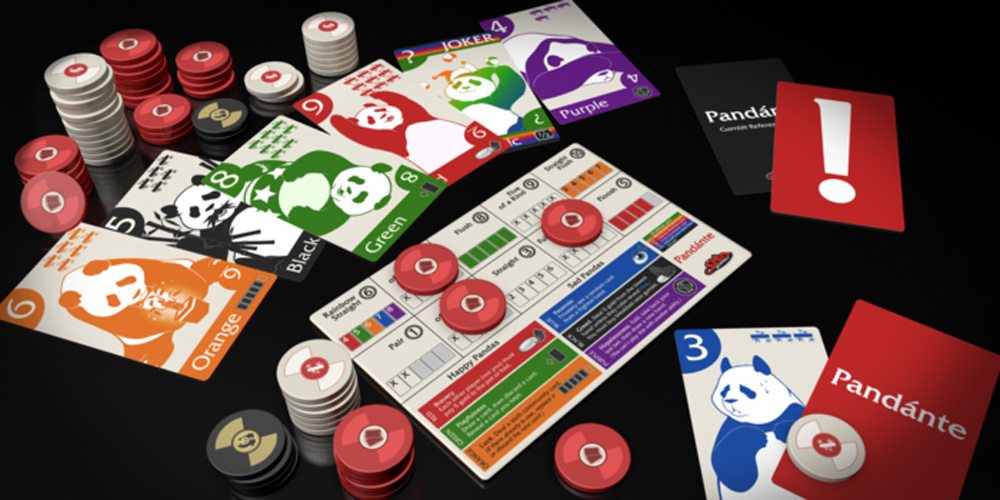




Spotted one major mistake in the rules description (unless it’s just a typo): you don’t have to fold if you’re called out on your ability claim, only on your hand at the showdown. I think that would punish lying about abilities way too much.